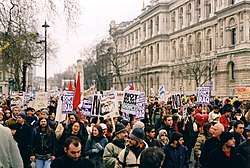Overview of articles
Top level overview articles

Major overview subdivisions
- Prelude to the Iraq War
- Rationale for the Iraq War
- Occupation of Iraq (2003–2011)
- Iraqi insurgency (2003–2011)
- Anbar campaign (2003–2011)
- Fallujah during the Iraq War
- Execution of Saddam Hussein (2006)
- Iraqi civil war (2006–2008)
- Iraq War troop surge of 2007
- Withdrawal of United States troops from Iraq (2007–2011)








